Tales From the Road III: Disenchantment
This is a free post made possible by paid subscribers.
Writing is my profession and calling. If you find value in my work, please consider becoming a subscriber to support it.
Already subscribed but want to lend additional patronage? Prefer not to subscribe, but want to offer one-time support? You can leave a tip to keep this project going by clicking the link of your choice: (Venmo/Paypal/Stripe)
Thank you for reading, and for your support!
Nearly two months after I started, and after a 30-day-straight run of work, I’m not delivering food much these days. Too many expenses, too little pay, too much unpredictability, too much wear-and-tear on an expensive vehicle made for off-roading, not excessive city driving. My poor Ruby has gained over 6,000 miles since I kicked off this gig. Too much, too soon. At this point, I’m just begging for some expensive repairs.
On the nights I do work, the experience is not what it used to be.
For starters, the Arizona heat has set in. Tonight, as I head out to work, it’s a little after 5PM, and the temperature is 111°F when I get in the car - that’s just a hair shy of 44°C for you non-Americans out there. But my Jeep is charcoal gray with a black soft-top, so inside it’s a refreshing 125°F - nearly 52°C. I know this because I brought my meat thermometer with me and let it sit on the passenger seat, its digital readout creeping up by several decimal places at a time before coming to a rest around the temperature of a steak cooked medium rare. It’s so hot that my sunglasses, having spent time inside my air conditioned house, begin fogging up around the edges. I fire up the engine and start the AC. Twenty minutes later, driving south down Tatum Blvd, it’s only cooled off to 102°.
I try to stay both hydrated and awake. I start with an electrolyte drink before leaving home, but while driving I switch to an iced americano. The cream in my coffee tastes good, but makes me thirstier. I finish that and switch to my large insulated tumbler of water. It’s going to be a non-stop intake of liquids tonight.
First pick up is a pizza run. As I make my way to the drop-off, the delicious smell of a hot pie wafting from my insulated bag, a young woman driving a black hatchback in the oncoming lane fails to calculate the time needed to make her left-hand turn in front of me. She stutter stops, then halfheartedly glares at me like having to wait for me to pass so she can make her turn is somehow my fault.
Sorry lady, I think, that’s on you. You’re gonna have to figure out how to drive.
The sun is inching slowly towards the horizon and with it, the digital mercury slowly creeps down as well. 15 minutes into my shift the outside temp is at 109°. The Jeep is still a pizza-scented sauna. The air conditioner can’t keep up.
At this point in the year, I live for the dark.
Not for the first time, I think about how I need a small, white, fuel efficient vehicle. One with a killer cooling system. But the cash I would have to outlay to buy another vehicle would seemingly negate the tiny financial advantage doing this kind of gig work offers in the first place. I only made 90 bucks last night for five hours of work, and I don’t expect tonight’s haul to be much better.
A thought comes, unbidden:
I’m a writer, goddamnit. What am I doing out here?
What I’m doing is dictating essay ideas to the Notes app in my iPhone as I drive fast food around to people who don’t want to get in their own cars to get it themselves. The app I use to track such things says my average pay this week is $21.87/hour. Before expenses. Not my worst week, but not my best, either.
I can’t deny that I get more ideas when I’m out on the road, but I’m not doing much with them. Is this what it’s come to? Is this all I’m capable of? Have I already peaked, nothing left to do but diminish and go into the West?
My imposter syndrome keeps flaring up, telling me that I’ve already done everything I was ever going to do that mattered; that I’ve peaked, washed out, and will be stuck working menial jobs for the rest of my life. It’s a hard voice to quiet when you’re doing this kind of job at my age. I don’t see anyone hiring a gray-bearded grandfather with a spotty career history and a decade of self-published cancellable trad Catholic culture commentary as his lone claim to success.
I don’t know what I’m for anymore.
I look and see that the pizza delivery is on the third floor of an apartment building I can only imagine has no elevator. I envision hauling my 6’4”, 325 pound bulk up the exterior steps, melting as I go like an ice cube on a hot skillet.
When I get there, there’s good news: the apartment building has an elevator, and it’s actually indoors. The bad news is that I have to do two full laps around the building on foot just to find the single, partially hidden entrance that has a keypad for entry. After that, the delivery is quick, but on my way out, I get lost as I try to find an exit on the same side of the building as I parked. It’s a funhouse maze of identical looking doors down a windowless hallway. A liminal space that could lead anywhere.
It feels almost symbolic.
Fortunately, when I do eventually find my way out, the screaming jet engine noise of my jeep’s struggling vent fan acts like a homing beacon, helping me find my way.
In case you think I’m exaggerating, this is what it sounds like on a hot day:
There is a kind of artificial canyon that is formed by the valley that is the parking lot, surrounded on every side by large apartment buildings. As I pause on the sidewalk, I’m hit with a furnace blast of superheated air, like someone is holding a giant ventilation fan in front of an oven.
Strangely, there’s a certain consolation in that heat. It’s familiar. It means my old nemesis, the desert summer, is back. It means pool time and cold drinks and people dressed for the beach even with no beach nearby. It means misters on every restaurant with outdoor seating and that incomparable feeling of slipping between the icy cool of air conditioned spaces and the skin-searing temperatures outdoors, the fine spray of water creating artificial fog that clouds the streets.
The first time I experienced an Arizona summer, it staggered me. I felt like I had walked into a brick wall made of invisible pain. But over time, I adapted, and eventually, I fell into the old cliché: “It’s a dry heat.”
For me, at least, it really does beat humidity.
Either way, I’m a single delivery into my night, and I’ve probably already lost about 8 ounces of water weight.
The next order is from a burgers and custard kind of place, and though I’m supposed to verify what’s on the receipt with what’s on my screen, it’s a big bag and when the girl tells me, “That’s everything!” I decide to just believe her. I make my way back to the handicap spot I borrowed because there was no other parking, and just as I’m getting ready to pull out, another young lady comes running out of the shop with a couple of milkshakes that were supposed to be included.
I always check my orders so that doesn’t happen. I’m getting sloppy. Fortunately, all’s well that ends well, and I’m off to the races.
As I make one more pickup from a different restaurant in the same plaza, a man emerges from the upscale New Mexican place on the corner to grab a smoke, looking like a Sinaloa cowboy. He appears to be in his mid-to late 50s, slightly on the short and stocky side, but he radiates a kind of barely-restrained violence. His white silk button up shirt is open by several buttons at the chest, revealing a thick neck. The smooth fabric hangs loosely, untucked, over a large, round belly. His dark blue jeans are pulled down, uncuffed, over black leather cowboy boots. He wears a 10 gallon hat, also black leather, over a head that appears to be shaved completely bald. His thick pencil moustache is jet black, so dark that it’s obviously dyed that color, and his fingers and wrists are decked out in thick ornamental silver bracelets and rings. A cigarette hangs loosely from his right hand, and as he notices me looking at him, he stares at me suspiciously. I pretend not to see the look.
The sun slinks lower now, causing the palo verdes and saguaros to cast long shadows across the road, but the temperature continues to hold at 108°. My evening settles into a familiar rhythm: pick up, deliver, new order; pick up, deliver, new order. It’s like a dance, but one that only has three repeating steps. It’s just the right amount of rote activity to keep the hyperactive, distractible part of my mind busy, which allows the more creative part to wander in a way that is unusually productive. Kind of like how your best ideas don’t just come to you in the shower letting the water run, but while you’re going through the motions of washing. Like you have to be actively engaged in some mindless activity for that part of you to come unlocked. This unbidden ideation, along with the physical exercise — and the overall therapeutic benefit both produce — are the greatest perks of the job. It’s a kind of “bonus pay” that adds an intangible benefit to the top of the relatively meager pile of cash that comes in. I don’t need a gym membership when I’m doing this job, and all my best ideas come to me on the road.
These days, my desk feels like the instrument of creative oppression. Most times when I sit there and try to think, I get distracted with something stupid and trivial. And yet it’s where the work I do is done.
I get a Walgreens order to shop for and deliver a single item. I can’t see what it is without accepting the job, but the note says it requires “customer verification,” so it’s probably some kind of booze. The store, just on the sketchy fringes of otherwise-upscale Arcadia, is one of those Arizona anomalies I first encountered decades ago: a regular drug store with a complete liquor store section tacked onto the side. Alcohol is loosely regulated here, and although you don’t see full liquor selections at most pharmacies, this one is old-school. I make my way past racks of whiskey and tequila and find a 12 pack of cold Stella Artois bottles in a package that matches the bar code that I’m supposed to scan into the app. I pay using the inscrutable corporate credit line imported into the Apple Pay Wallet on my phone, take a photo of the receipt, then head out.
I deliver the beer to a bored-looking guy of indeterminate age with red hair and a red beard. He lives on the second floor of an utterly uninteresting apartment complex. The entire place is non-descript, a typical 60s-style labyrinth of concrete and thick brown stucco under an eclectic assortment of both flat shingle and gabled red tile roofs, with a generic, vaguely resort-ish name like The Montecito or Coral Grove. (I drive back by later, and laugh when I see that it’s actually called Monterra. My guess was close!)
Each unit has a little stuccoed back wall and a little sliding glass door that opens onto a little cement slab with just about enough space to sit in a single lawn chair, facing sideways, contemplating yet another wall.
The grounds are well-kept and entirely inoffensive, the landscaping pleasant and less than a week overgrown. The pool is small but tidy, the water a crystal clear cool blue. A row of inset mailboxes the same color as the stucco stands under an overhang by the leasing office, which, at this point in the evening, is closed. The perimeter of the complex is ringed by a row of covered parking spaces, full of Hyundai Elantras and Nissan Maximas and Toyota Corollas and Honda Accords, every space home to some sensible, fuel-efficient vehicle at least several years old.
The whole place makes me vaguely uneasy. “It’s a beige place,” I catch myself saying out loud, just past the mailboxes, and I realize as I say it that it’s not so much because of the muted brown paint, but because the whole ambiance is that of a kind of institutionalized mediocrity. If there is nothing egregious about it, there’s nothing exceptional either. It’s all entirely forgettable; a liminal space of the sort where excitement and ambition go to die.
I can’t help feeling as though living here must be like a kind of protracted, nonviolent suicide; a slow dying off of the feeling that anything matters except which microwave meal to pop in on a given evening, or which show to watch; a long, silent surrender to the siren’s song of sensible stability, luring men to shipwreck on the rocks of ceaseless banality.
There’s a crazy woman on the northwest corner of Tatum and Shea. I can’t tell if she’s in her late 20s and living hard, or her mid 40s and not taking care of herself like she used to. She has a pretty face with good bone structure, despite the wear and tear, and cleaned up, I suspect she’d look perfectly at home at a country club cocktail party. Her white leggings are surprisingly clean for being out on the streets, but her pale teal sweatshirt has dirt smeared across the right shoulder and chest. Her long brown hair, spilling out from beneath a black nylon baseball cap, looks like it was styled not terribly long ago. She’s either shoving something into or taking something out of a black duffle bag on the ground. Her movements, made from a deep squat, are obscured by a vehicle in the right lane. She makes me wonder if she’s some middle schooler’s mother who had a mental breakdown and wound up like this, or what her story is. There’s something feral in her eyes and movements, but she just doesn’t look like she belongs out here. There’s a type, a kind of nomadic fusion of monster and man, taking on the uncanny valley ambience of an orc. I see them everywhere. This one is still human, though. She has not yet transformed. I hope, for her sake, she won’t.
She’s gone by the time I make my way back through the intersection ten minutes later.
I pick up an order from an Asian fusion restaurant I’ve never been to, and it brings me into a chaotic space. A half dozen or so outdoor tables sit empty, since it’s too hot to use them. Instead, everyone who has come here to eat is packed inside. A brown-skinned woman of indeterminate ethnicity who has no idea how to sit while wearing a short skirt is next to a baby girl in a car-seat on the floor. The baby lets loose a loud, wet cough. At a different table, a white, chinless man with tight gray-brown curls nibbles at something, his jerky movements reminding me of a turkey. Some of the workers are clearly from Asia, but the man at the front counter and the customers at most of the tables are white. As someone who married into a Chinese family a couple decades ago, I’ve come to understand that certain Asian restaurants attract most of their clientele from the home country — an indicator of authentic cuisine — and others cater mostly to the American palate. This place is clearly the latter, and somehow, most of the customers remind me of poorly-designed NPCs. The whole place is too cramped, with both stuff and people. The order I’m picking up isn’t ready, but there’s no place for me to stand out of the way. I squeeze into a corner by a large wicker jug of sake on a shelf. Lower down, on the edge of a counter and spilling over onto a makeshift table, a pile of small, clear plastic to-go tubs also labeled “sake,” are stacked in rows atop a cluttered pile of other supplies. No matter where I stand, I keep getting in someone’s way, so I’m grateful when the bag of food is finally handed to me and I can make my exit.
In the places around town where shadows accumulate even under the unrelenting sun, in the nooks and crannies between commercial buildings and the power transformer boxes that sit outside of them, there is almost always someone hiding, sometimes more than one, huddled around pilfered scooters or bikes, animatedly doing whatever these people do within the shelter of their quasi-hiding places, toothless and troubled, blood bubbling with chemicals from half a world away. I intentionally try to avoid the parts of town where I see them on every corner, but sometimes I misread a delivery destination and wind up there anyway.
This time of year, right as the sun dips below the horizon, Arizona gets Blade Runner skies. The effect is most pronounced over the canals, which reflect the synthwave colors like a perfect mirror, but there’s almost never any place to stop and grab those photos, so I have to settle with a quick glimpse through the dirty, bug-splattered windshield.
A late-night sushi order takes me inside a chiaroscuro space at a place called Ra, deep shadows yielding to pools of soft, warm light, all colored by a constellation of red paper lanterns overhead. Even mostly empty, the whole place is a vibe, and I soak up the ambience while I wait for a young waitress who looks Japanese but sounds completely American to grab my order from the kitchen.
A little while later, I take a low-paying order for drive through donuts because the trip will bring me close to home. At the window, the kid working the shop hands me an extra white paper bag of donuts for me.
“What’s this for?” I ask.
“We’re closing in ten minutes, and we were going to have throw those away. I wanted to give them to you instead.”
I thank him, not telling him I’m borderline celiac, because I’ll bring them home for my kids. I used to love it when my dad brought me home things from work. He worked in retail management when I was small, so I’d get the unboxed toys unsupervised children left on the shelves, or the cartoon cardboard displays used to merchandise lunchboxes. Later, when he switched to working in contractor supply, he’d bring home samples of wood paneling that I’d use to build the walls and ceilings of blanket forts. It always made me feel like he cared about me and took the time to think of me, even when he was busy with something else. I hope my own children feel the same way.
The donuts are for someone in a trailer park. To get to their trailer, however, I have to weave my way through a rowdy crowd having a large outdoor barbecue. It’s a Mexican party, with the mariachi music and delicious-smelling food to match. It’s the kind of get together that can be a ton of fun if you’re ever lucky enough to be invited. Not even a language barrier can get in the way of a few shared cervezas and some carne asada cooked over smoky mesquite wood under an old iron grate propped up on some cinderblocks. Half a dozen young boys of various ages are playing wiffleball by streetlight in the little one-lane street that winds through the trailers, and they dutifully get out of the way as I carefully drive on through.
I’m about five miles from home, closing in on 10PM, and my 8-year-old daughter has called and told me again she can’t sleep when I’m gone. I start making my way back, declining several lowball offers for a few last deliveries before finally giving up and going offline.
I can tell that my time doing this gig is coming to an end. I plugged some financial holes with it and had some fun, but it’s just not quite enough to make it worth it for me. At this point, the greatest value in the work is the way it feeds me the textures and colors and faces of the city for later use. When I’m out driving, I can’t stop seeing and feeling things that have me thinking about being back at my keyboard, writing.
It’s where I belong. It’s where I was meant to be.




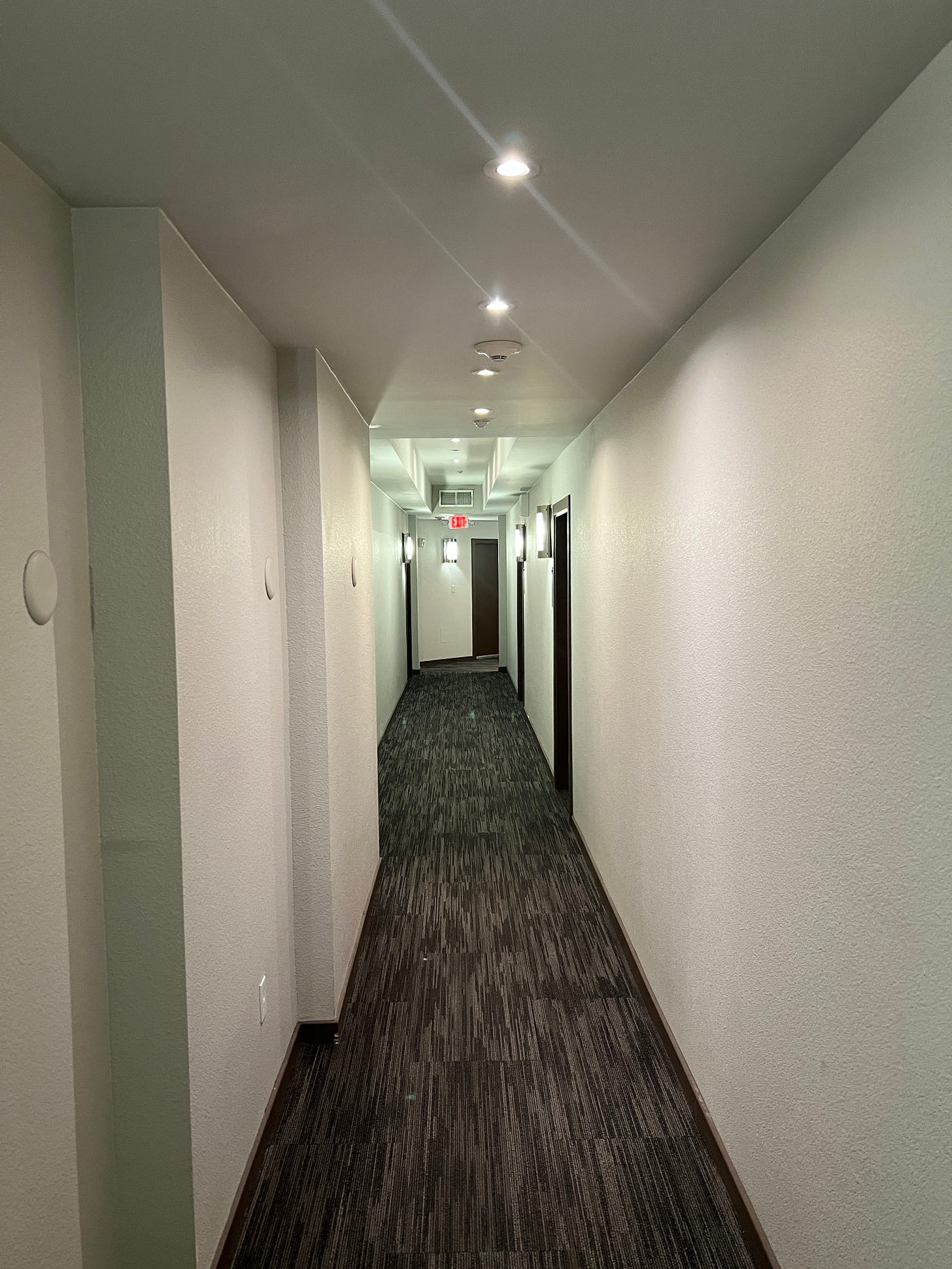
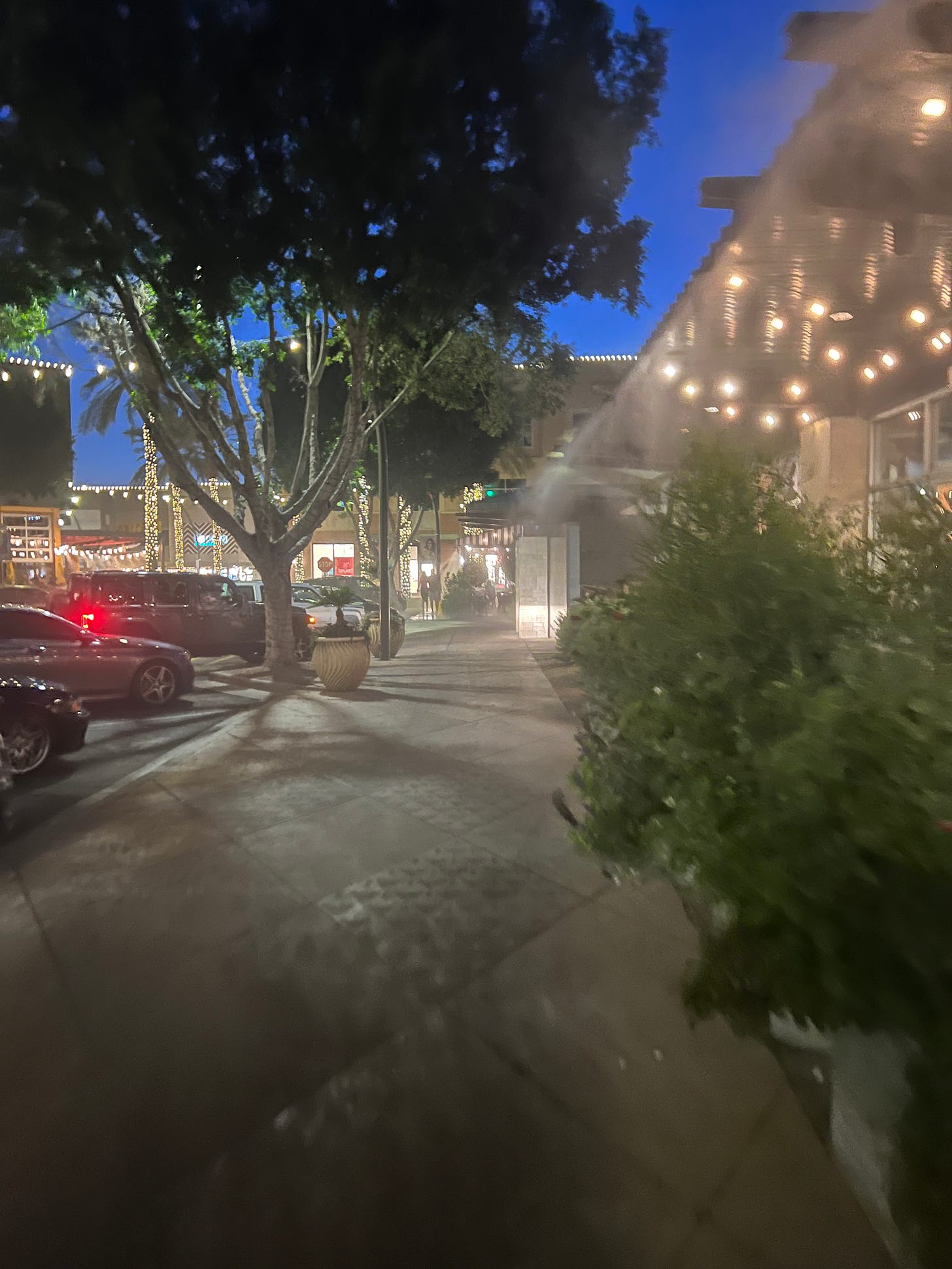
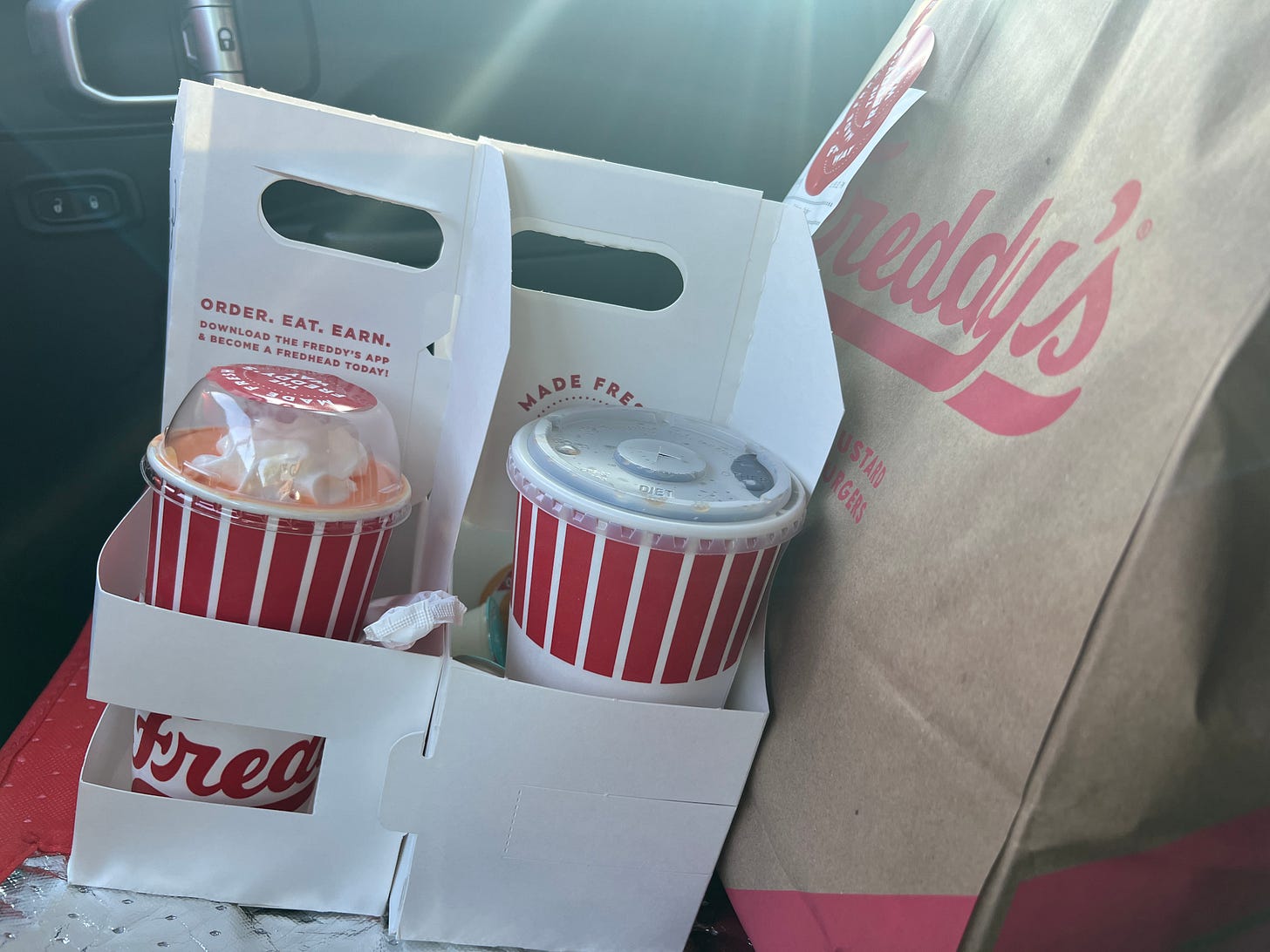
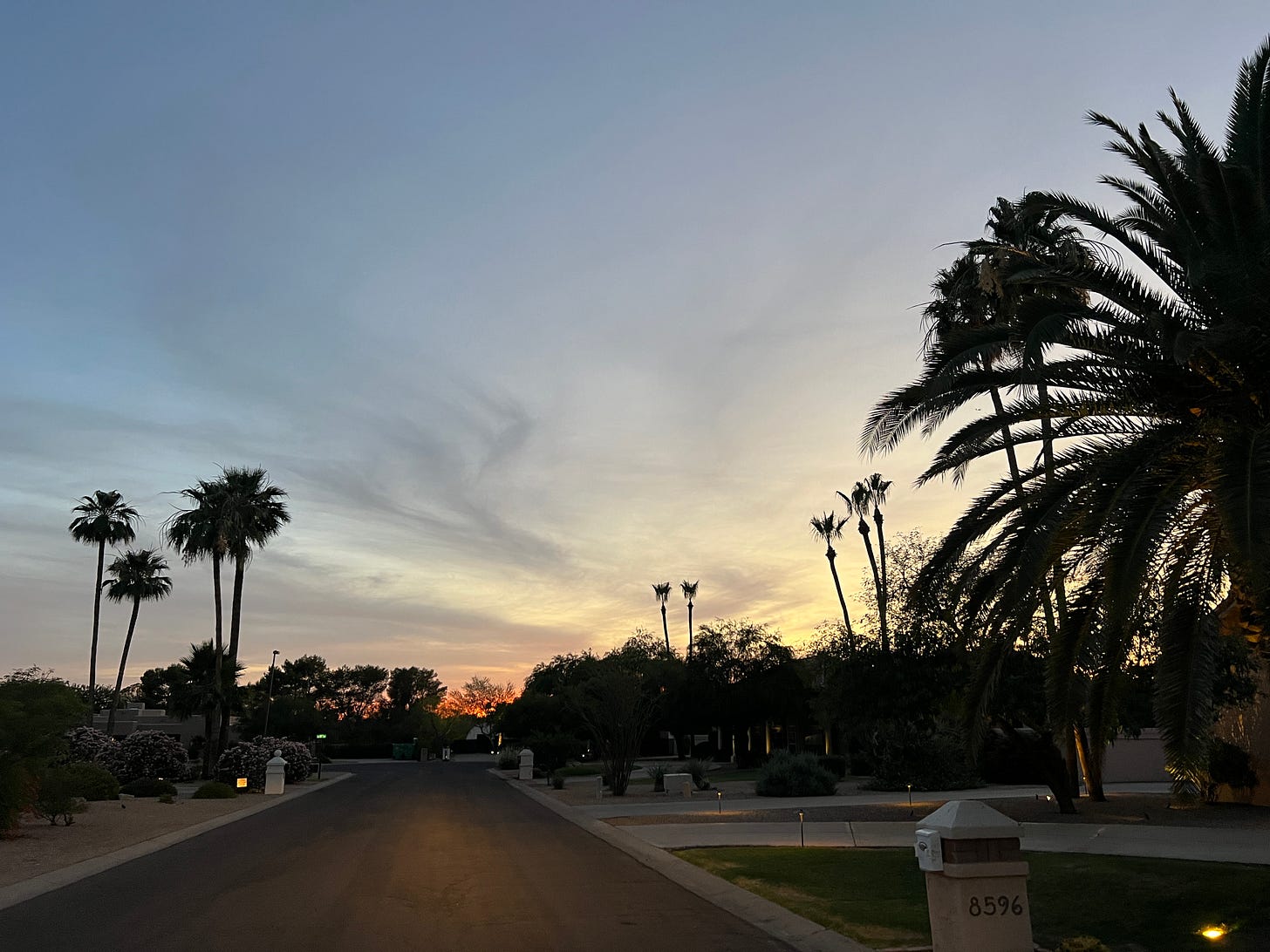
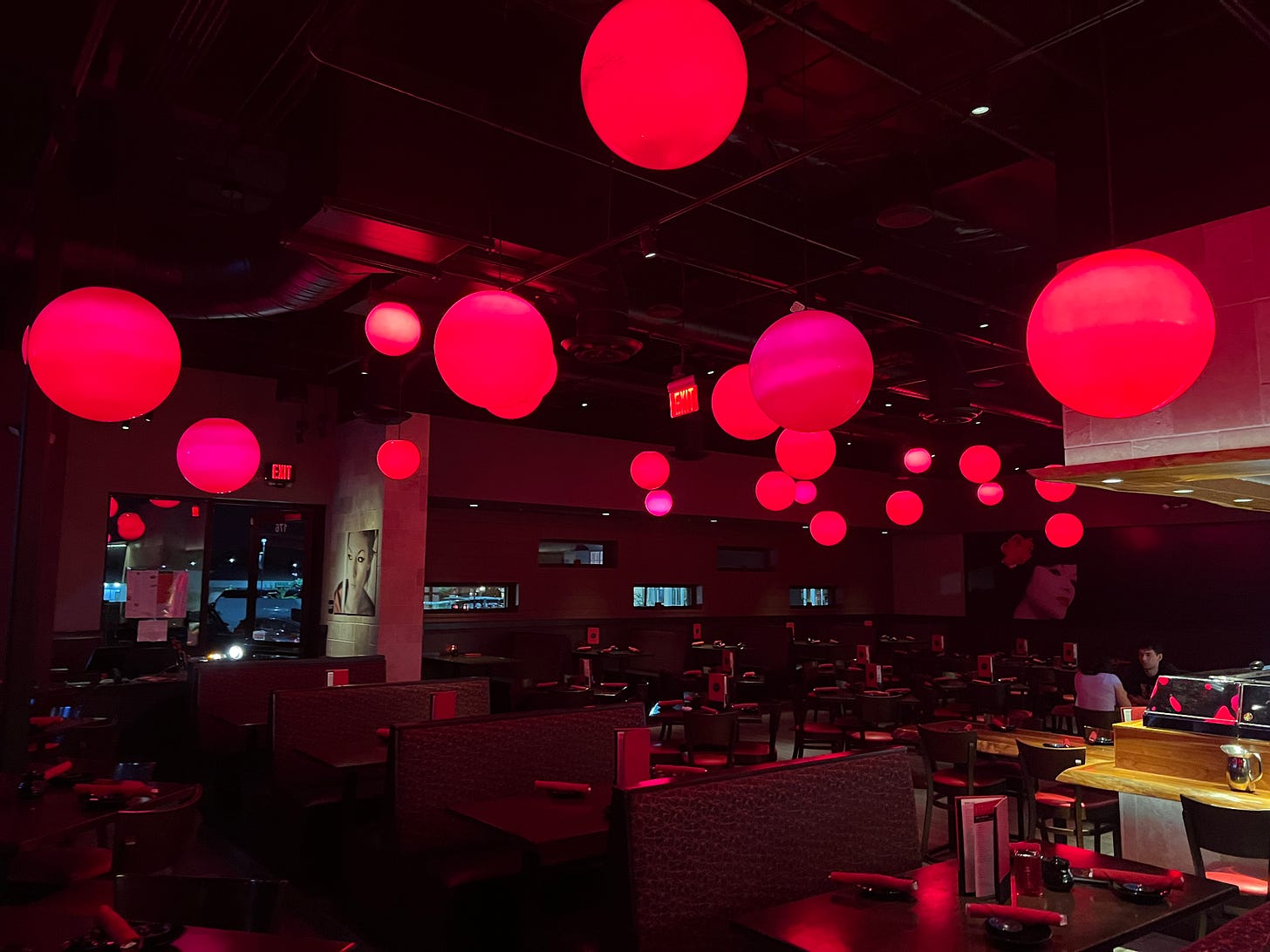
Bro, that’s your first chapter in a novel about a door dash driver who discovers a shady underbelly in Arizona, keep the vulnerability too, it’s a great piece of writing
Thanks for sharing the textures of the city Steve; there is something very liminal and unique about a Phoenix summer evening.